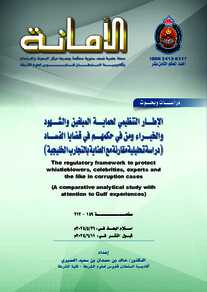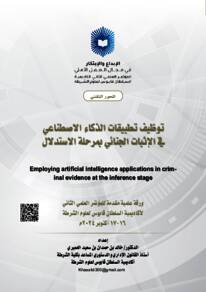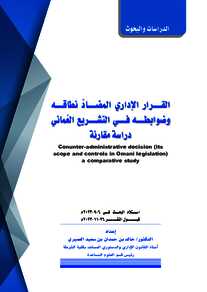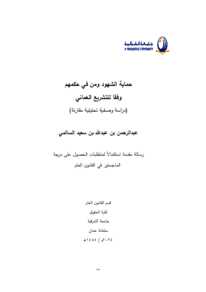Document
الإطار التنظيمي لحماية المبلغين والشهود والخبراء ومن في حكمهم في قضايا الفساد : (دراسة تحليلية مقارنة مع العناية بالتجارب الخليجية).
Source
الأمانة. ع. 43. ص. 1-64.
Other titles
The regulatory framework to protect whistleblowers, celebrities, experts and the like in corruption cases (A comparative analytical study with attention to Gulf experiences).
Country
عمان.
City
نزوى
Publisher
أكاديمية السلطان قابوس لعلوم الشرطة
Gregorian
2024
Language
Arabic
Subject
English abstract
Whistleblowers in corruption cases - as well as witnesses, experts - have a load to protect the public interest by exposing corruption, yet they are at risk of retaliation from the criminals. This research is based on a comparative analytical approach, as its problem revolves around how to organize the protection of those subjects in corruption cases at the international, regional levels specially the Gulf level. One of the results of this research is that the Inter-American Convention against Corruption is the first legal document that recognizes the international dimension of corruption, while the European Union directive pushes the issue of protection in corruption cases toward effective application and with a detailed scope. The African Union Convention on Preventing and Combating Corruption also focuses on some basic principles of protection in corruption cases, recommending taking various measures to protect those who report crimes. The Arab Anti-Corruption Convention clarifies those covered by protection in corruption cases, with an explanation of the methods of achieving that protection. Finally, the Gulf legislative experience regarding protection in corruption cases was divided into existence of detailed, independent legislation in force, as in Kuwait and Emirates, while there is no such legislation in the Sultanate of Oman that has so far been content with scattered texts in several laws. The research recommends the importance of legalizing a special regulatory framework to protect those concerned in corruption cases, in Saudi Arabia, Oman and Bahrain, in accordance with the international commitment to combat corruption. There is also needed to complement the existing regulatory framework in some Gulf experiences in Kuwait, UAE and Qatar to protect those concerned in corruption cases in order to create a secret specific protection program.
ISSN
2412-8317
Hijri
1446
Arabic abstract
يأخذ المبلغون في قضايا الفساد وكذلك الشهود والخبراء ومن في حكمهم على عاتقهم حماية الصالح العام من خلال الكشف عن الفساد، ومع ذلك فهم معرضون الخطر الانتقام من ذوي النفوذ. يعتمد هذا البحث على منهج تحليلي مقارن، حيث تدور إشكاليته حول كيفية تنظيم حماية المشمولين بالحماية في قضايا الفساد على المستويات الدولية الإقليمية وفي القلب منها المستوى الخليجي، ومن أبرز نتائج البحث أنه يحسب لاتفاقية البلدان الأمريكية لمكافحة الفساد الزيادة في مجال حماية المشمول بها، باعتبارها أول وثيقة قانونية تدرك البعد الدولي للفساد، بينما يحسب لتوجيه الاتحاد الأوروبي أنه نقل مسألة الحماية في قضايا الفساد المجال التطبيق الفعال وبنطاق تفصيلي يحقق الغاية من تلك الحماية. كذلك تركز اتفاقية الاتحاد الأفريقي لمنع ومكافحة الفساد على بعض المبادئ الأساسية للحماية في قضايا الفساد، مع التوصية باتخاذ تدابير مختلفة تهدف إلى حماية المبلغين عن الجرائم، بينما اعتنت الاتفاقية العربية لمكافحة الفساد ببيان المشمولين بالحماية في قضايا الفساد، مع بيان طرائق تحقيق تلك الحماية، وأخيرا انقسمت التجربة الخليجية التشريعية بشأن الحماية في قضايا الفساد إلى وجود تشريع تفصيلي مستقل ساري كما هو الحال في الكويت والإمارات، بينما لا يوجد مثل هذا التشريع في سلطنة عمان والتي اكتفت حتى الآن بنصوص متناثرة في عدة قوانين، ويوصي الباحث بأهمية إصدار إطار تنظيمي خاص بحماية ذوي الشأن في قضايا الفساد في بعض الدول الخليجية - كالسعودية وسلطنة عمان والبحرين توافقا مع الالتزام الدولي بمكافحة الفساد، وكذلك بضرورة استكمال الإطار التنظيمي الموجود ببعض التجارب الخليجية لحماية ذوي الشأن في قضايا الفساد كالكويت والإمارات وقطر لإنشاء برنامج سري لتلك الحماية.
Category
Journal articles




